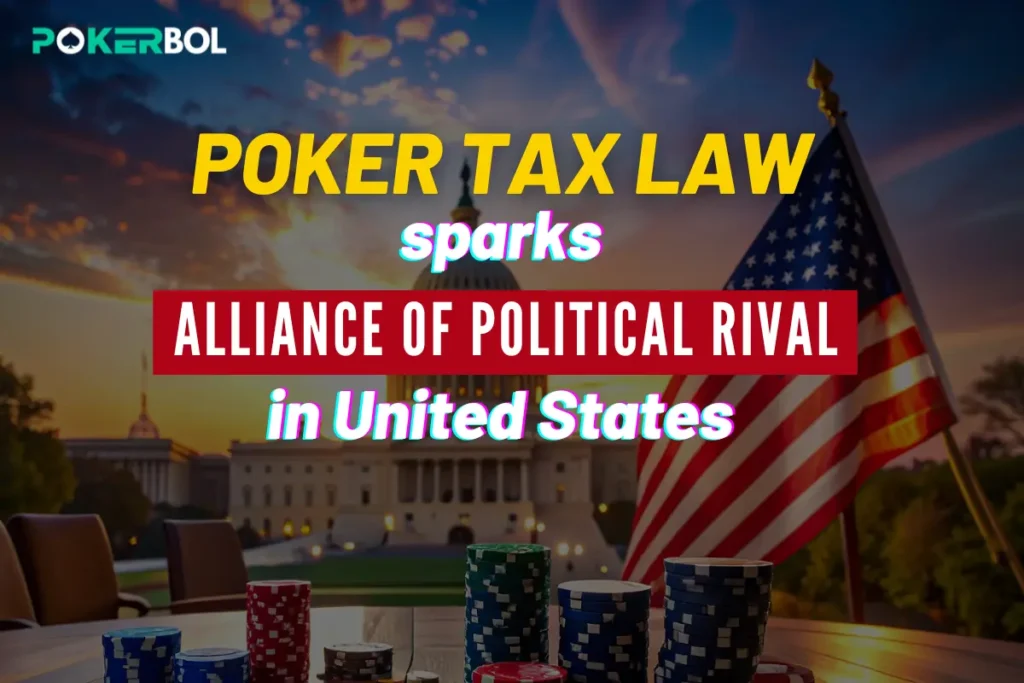Poker has long been a game of high stakes and strategy, but now it’s becoming a point of political contention in Washington. A new tax law buried within President Trump’s “One Big Beautiful Bill” has sparked a surprising bipartisan reaction, uniting U.S. politicians from both parties in a rare show of solidarity over a policy that threatens to financially burden professional poker players.
Also Read: How Trump’s Executive Order Could Affect Foreign Players at the 2025 WSOP?

Poker Legend to the Rescue?
The tax provision, which will go into effect in 2026, has drawn the ire of professional gamblers across the nation. The law, which limits the amount of gambling losses that can be deducted from taxable income, effectively caps those deductions at 90%. Under the new rule, a poker player who wins $150,000 and incurs $100,000 in losses would be taxed on $60,000, instead of only paying taxes on the $50,000 in profits.
This has caused outrage within the gambling community, with some arguing that it unfairly penalizes poker players who are already working in a profession filled with uncertainties and volatility. Even some lawmakers who voted for Trump’s bill, including Sen. Ted Cruz (R-Texas), have spoken out against the provision.
Cruz, an avid poker player and ally of Trump, acknowledged the issue on his podcast, “Verdict with Ted Cruz.” He explained that the tax change was a hidden surprise in the bill that “nobody saw coming” and has since become a cause he’s determined to address. Cruz’s stance was clear: “It punishes [poker players] and taxes them on income they didn’t even earn.”
Democrats and Republicans Come Together
In a surprising twist, Democrats and Republicans have come together to take action. Sen. Catherine Cortez Masto (D-Nevada) called the gambling tax policy “outrageous” on a podcast with poker pro Doug Polk. Cortez Masto, who represents the state with the nation’s largest concentration of professional poker players, expressed her belief that if the provision had been properly reviewed, it could have been stopped before passing into law.

Her sentiments were echoed by fellow Nevada Democrats Sen. Jacky Rosen and Rep. Dina Titus, both of whom have now teamed up with Cruz to work on legislation aimed at fixing the “wildly unfair” tax law.
The bipartisan effort has been spearheaded by Cruz, who, despite his political differences with the Nevada senators, has joined forces to push for a solution.
“We were moving incredibly fast at 3 in the morning, and so nobody saw it there,” Cruz explained, highlighting the rapid pace at which the bill was passed. “But when I heard about it, I said, ‘that makes no sense at all.’”
Together, these lawmakers have introduced legislation to correct the provision, though Cruz admitted that changing any part of a law once it’s signed into effect is a complicated process. Still, he emphasized that there is near-universal agreement among senators that this particular tax policy needs to be fixed.
Poker’s Influence on Politics
The unlikely political alliance formed over poker taxes is a reflection of the influence poker has in American culture. From Senator Cruz, who enjoys watching the World Series of Poker (WSOP), to Phil Hellmuth, one of the game’s most legendary players, poker is a game that crosses political and social boundaries.
Hellmuth, who has played with Cruz in private games, has been vocal in his support for fixing the law, calling it the “Poker Players’ Death Tax.” The poker Hall of Famer has encouraged Cruz and other lawmakers to champion the cause and protect poker players from unfair taxation.

The controversy surrounding the gambling tax provision has brought attention not only to the impact on poker players but also to broader issues related to gambling policies in the U.S. With states like Nevada leading the charge, the issue of poker and tax fairness is likely to remain in the spotlight as both parties work to address the imbalance.
Also Read: Donald Trump Chooses Poker Enthusiast Billy Long as New IRS Commissioner
Final Thoughts: A High-Stakes Issue
The push to amend the controversial poker tax law is an example of how a seemingly niche issue—tax laws affecting poker players—can unite rival political factions. As the debate over this “Poker Players Death Tax” continues, the stakes couldn’t be higher for professional gamblers. If not addressed, the policy could force players to reconsider their careers in the U.S. and even drive them to compete in friendlier jurisdictions abroad. Whether or not the law is amended, the issue highlights the power of poker in politics—and just how far lawmakers are willing to go for the game.
Image Courtesy: PEXELS
Content Courtesy: PokerNews

